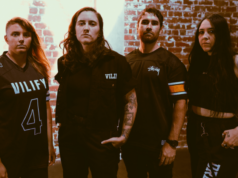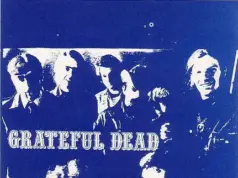
If at first you don’t succeed, dust yourself off and try again. Megan Washington could never be accused of failing to heed this advice. Over the last six years, the alternative pop songwriter has tried her hand at writing musicals, film scores and narrative podcasts, while also pumping out a regular stream of singles. The latter came in the wake of two albums – 2010’s I Believe You Liar and 2014’s There There – that turned Washington into one of the most widely recognised Australian musicians of her generation.
But despite the flow of singles and plurality of extracurriculars, Washington often found herself at an impasse in the years following There There. She desperately wanted to create a successor to this ARIA nominated work – she wasn’t deferring because she’d decided podcasts and voice acting were now a more interesting use of her time – but she couldn’t figure out what form her next album would take.
In the past, Washington would sublimate personal misery into dramatic pop music. It’s apparent in many of her best-known singles, including 2011’s ‘Holy Moses’ and 2014’s ‘My Heart Is a Wheel’. But since marrying filmmaker Nick Waterman in 2017 and giving birth to the couple’s first child, Washington has been enjoying something akin to domestic bliss. And so after repeated false starts, the Brisbane-based performer was all but ready to call time on her career as a pop songwriter.
“I had been trying for five years and failing for five years to finish this album,” she says. “AndI don’t want to say that I quit pop music, but in my heart, I quit. I was like, look, it shouldn’t be this hard.”
That was until she wrote ‘Batflowers’, a low-key power ballad that appears as the title track on her just-released third album. The lyrics directly address Washington’s struggles to move forward with her art. “I wanna bring you flowers so you keep on going,” she sings near the song’s end – and the ploy was successful, serving to illuminate the path forward for the project.
After recording ‘Batflowers’ with LA producer Rabitt (Lime Cordiale, Andy Grammer) in February 2020, Washington spent the next four months pooling together various recordings from the last five years and working hard on just about every other aspect of the release, from A&R to art direction and music video animation. The result is her most confident, tender and uplifting body of work to date, which rebuffs the notion that personal gloom is an essential prerequisite for meaningful creative work.
Music Feeds spoke to Washington about overcoming her doubts, looking after herself, and reassessing her artistic purpose on Batflowers.
Music Feeds: Batflowers is finally here. It’s six years since There There and you’ve released more than half a dozen singles over the last five years. What’s the dominant emotion now that the album is out there?
Megan Washington: It took a lot of effort, but that effort is invisible because I went to all that effort three or four months ago. I started in lockdown and I finished in June. The pain is over now. It’s just the fun bit, which is other people writing articles about how amazing it is. Ultimately, I have no expectation for this album, because I made it because I needed to make it because I am an artist and making records is what I do. I just wanted to make something that would be at worst, 53 minutes of time out and at best, nourishing.
MF: You’ve said you were a bit stumped at the beginning of the process given there hasn’t been as much tumult in your personal life compared to when you were making your previous two albums. In the past, would you seek out situations that’d cause personal suffering or heartache in order to activate your creativity?
MW: Well, you kind of just have to method-act for ages. I was practically a teenager and running around just doing all the normal shit that people do in their 20s, but on top of that I was writing songs about it and those songs were working. It’s kind of a weird reward system – every time I write a song about some fucked up relationship and everyone likes the song, then I can pay my rent and go on tour and meet more people and have more fucked up relationships. That was kind of the cycle of that whole chapter of my life.
MF: You’re now married and have a son, and after spending time in Melbourne, Sydney, New York and Berlin, you’ve moved back to Brisbane. Has your outlook changed significantly?
MW: I actually realised that I don’t care about how the music feels anymore because I want to feel happy and safe and calm. And I want to put all the chaos into my art so that my real life can be incredibly boring and I can do what I did this morning, which is, go to Pilates at 8 a.m. because that’s a good way to look after yourself.
MF: You wanted to make something that’d be nourishing and make people happy. Was that goal in the foreground when you were working on the album?
MW: So, because the whole record came from the title track, the whole soul of why I did it is in that song. Somebody said to me, “sometimes the thing you love is not the thing that you’re the best at.” And that really struck me because I was like, well, maybe I’m not supposed to do this, because I was having a lot of fun making film scores and writing musicals and writing podcasts and doing all this other shit which was incredibly pain-free.
But then I wrote [‘Batflowers’]. I wrote it for fun and I wrote it with no expectations, and when I was writing the lyrics, I was writing to myself. Like, the person that I’m telling to keep going is myself, because I just wanted to quit. So just the effortlessness with which that came together gave me this new feeling of, like, oh fuck, I feel like this might be a way forward.
MF: That song is instantly so much more meaningful knowing it’s a message to yourself.
MW: All those lyrics, none of them are true, they’re just what I wanted to be true. They’re just things that I wanted to be able to say to myself. Like, I want to bring myself good luck and I feel like that song is written from the worst version of myself to the best version of myself. It was really embarrassing to have to go that deep, but I realised when I did it that that’s where I have to stay.
MF: Do you mean you realised you had to be unafraid to expose less-flattering parts of your psyche in your songs?
MW: Every time I try and write something that’s not me or that’s not completely, entirely what I feel, people just don’t care, and that’s because I don’t care either. But with this record, because that song is why I kept going, because I already said to myself, “well you’ve fucking written this song now, put your money where your mouth is.” So I did, I kept going, and that line about reading all my own bad poetry, that’s because that’s my biggest fear. My biggest fear is that my lyrics are just bad poetry. I was almost going to call my record “Bad Poetry” because then I’ve already made the joke. But that’s no fun and that’s not the vibe.
MF: It’s not the vibe at all.
MW: It’s not. I want this record to be an invitation, and flowers are really nice, when people give them to you it’s always nice. And I just really wanted to make something that had enough layers, that was full and complete enough that people could come back to more than once and find new things inside the songs and inside the art and inside the animations for them, just from me.
–
The post Megan Washington All But Quit Pop Music, Then Came Batflowers appeared first on Music Feeds.

![Maggie Rose Talks ‘No One Gets Out Alive’, Don Hart, Gamehendge, & Her Triumphant Ham Sandwich [Interview] IMG 1604](https://utterbuzz.com/wp-content/uploads/2024/04/IMG_1604-238x178.jpg)






